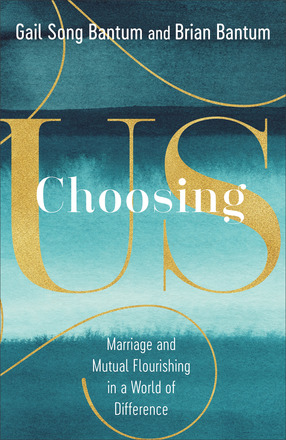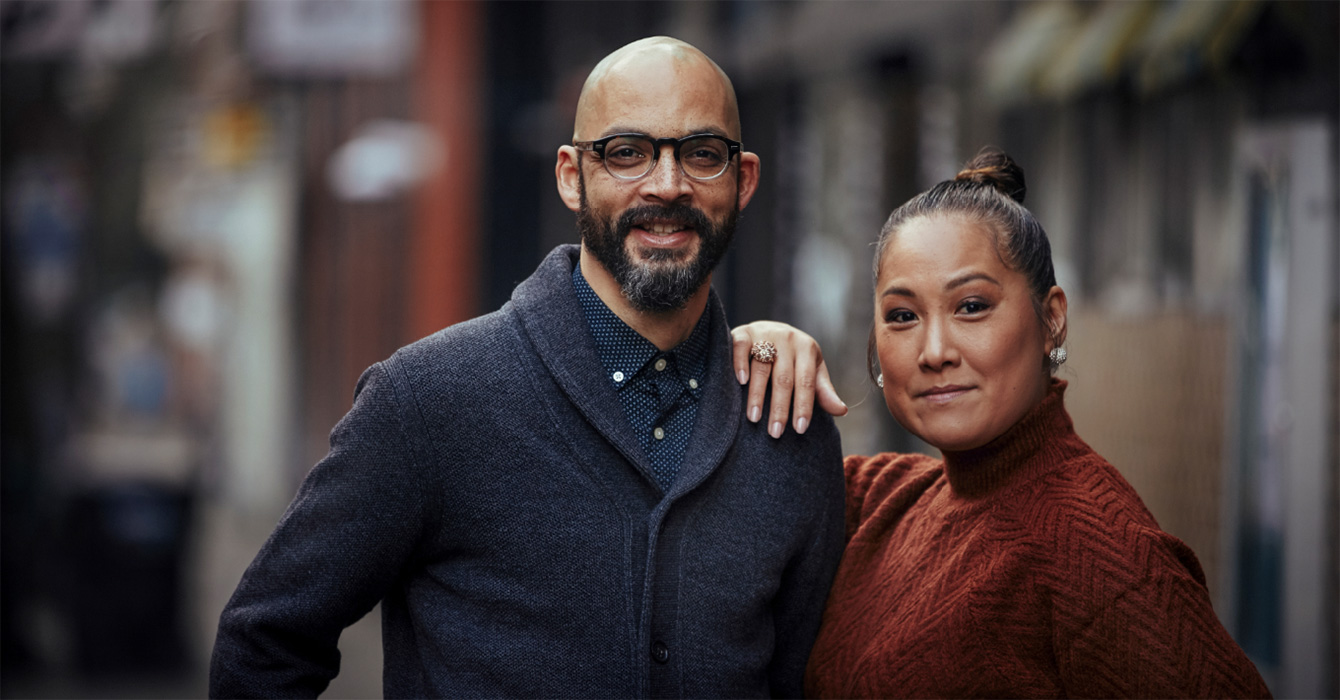Most marriage books aren’t necessarily written with couples like Gail Song Bantum, a Korean American woman, and Brian Bantum, a Black man, in mind.
As an interracial couple, they both have to deal with the prejudices of other people, including their own families, and navigate the cultural differences that they bring to the table.
“The marriage books that I know didn’t talk about the intersections of difference,” Gail said. “Maybe personality differences and love language differences, but nothing that dealt with cultural and racial differences, really dug into patriarchy and gender realities.”
Navigating differences of race and gender is a key theme throughout the Bantums’ relationship, and one that figures prominently throughout their new book, “Choosing Us: Marriage and Mutual Flourishing in a World of Difference.”

In an increasingly diverse society with increasingly diverse relationships, the Bantums hope that the book can offer witness to how a marriage can acknowledge and celebrate difference between partners.
Gail Song Bantum is the lead pastor of Quest Church in Seattle, Washington, and Brian Bantum is a professor of theology at Garrett-Evangelical Theological Seminary.
They spoke with Faith & Leadership’s Chris Karnadi about their own marriage and how they came to write a marriage book. The following is an edited transcript.
Faith & Leadership: What led you to write a marriage book?
Gail Song Bantum: We never actually planned to write a marriage book. That was never in our trajectory of what we saw ourselves being about, even though we’d been married for 25 years at that point.
But the possibility of writing something together was appealing. When we asked ourselves what we would write about, we kept coming back to the things that people learn from us, whether it’s in a ministry context or academia, and the thing that kept coming up for us both was our story.
Every time we shared our story, it seemed to resonate with folks, whether it was our story together, my story or Brian’s story. They wanted to know how two people pursuing their call worked in tandem. I think that’s kind of where the impetus was to write a marriage book initially.
F&L: What do you hope people will learn and take away from it?
GSB: The marriage books that I know didn’t talk about the intersections of difference. Maybe personality differences and love language differences, but nothing that dealt with cultural and racial differences, really dug into patriarchy and gender realities.
I know, for me, those chapters on race and on gender and masculinity are critical, because I think they’re pretty unique compared with some of the other marriage books that I’ve seen and read. In an increasingly diverse society, there are more and more people who occupy those spaces of in-betweenness, of interracial, multiethnic and cross-cultural relationships.
F&L: How did you have to face whiteness in your marriage?
Brian Bantum: I think there are two layers to it. One is facing how we’ve been formed by whiteness. Whiteness isn’t just about a color or a racial signifier. It’s also about, really, a certain way of trying to control circumstances, control other kinds of people. It’s a way of oftentimes centering one’s concerns in the world so that all things have to rotate and revolve around the needs of particular people.
For both of us as people of color, navigating whiteness is also about how do you either resist or navigate, appropriate or approximate those kinds of power in various ways.
Then there’s also the question of how do you resist the formation of whiteness. How does it press in and create constant frustrations, and then how do we as a couple begin to navigate those things?
My tendency is always to try to find a way around a problem, and with as little confrontation as possible, whereas Gail’s personality is meeting a wall, an obstruction, an injustice head-on. Even the way we resist whiteness requires something of each of us. It requires us to hear each other’s stories and understand what those histories are and how they’re informing us, and even how we’re reading a particular situation in lots of ways.
F&L: How did your own respective understandings of gender develop over the years of your marriage?
BB: I came to Christ in a Southern Baptist church only about two years before Gail and I met. That experience was kind of strange, because I grew up in a house full of really strong women and heard all of the reality that they had faced in the workplace and my mom’s sometimes difficult experience with my own father.
I think I still bought into that Southern Baptist sense of complementarianism — that there are things that women should do and there are things that men should do — and I didn’t know any better.
In meeting Gail, a lot of that was challenged really quickly. You hear this person say, “Well, actually, my mom was called to ministry; I do ministry; I feel called to this,” and then talk a little bit about how she reads the Bible and the things that she sees. All of a sudden, you go back and start to see all of these different kinds of complications of different lenses.
But just because I realized, “Oh, wait a second, women can be in ministry” doesn’t mean that we actually realized the ways patriarchal patterns continued to persist in our lives, like with how much invisible work women are just shouldered with all the time.
GSB: When you asked this question, my mind went everywhere, because I feel like I constantly navigate so many different spaces. I also brought a lot of assumptions about gender roles into our relationship. I remember early in our marriage, I just had this expectation that Brian would always take care of the car stuff and fix stuff in the house, while also believing that, “Oh, women can do all kinds of things.”
Finally, when we owned a house, I found that I loved mowing the lawn, and I’m like, “Oh, that’s fun; I want to do that.” I hated cooking, but then Brian ended up loving cooking. So eventually, it’s evolved into us just doing things based on our giftings or what we love to do or what we don’t like to do.
I think that’s how it’s settled for us. I am a woman who is really strong. I’ve only known strong women as my mentors and my mother, but I also am deeply fond of chivalry. I just love when Brian or my sons open the door for me. I eat that up, and I’m not shy about it. But will I also mow the lawn and weed wack? Yes. It’s not all or nothing. I love both.
F&L: The name of the book is ‘Choosing Us.’ What is the importance of that choice in marriage?
BB: We live in a society that’s full of choices, and in some ways that’s overwhelming. I mean, we can’t get anybody in the house to all watch one show anymore, because everyone is so used to having a super niche set of things.
I think part of the power of a marriage covenant isn’t so much that I have a choice between all of these things and there’s also just the perfect person for me, but it’s really the choice that’s saying who I am is going to be bound up and wrapped up in who you are.
This idea of covenant, I think, kind of intermingles the freedom of choice but then orients it in love toward another, with the hope and the trust that that person is also going to orient in love toward the other as well.
It becomes a choice for this person, for this community. We also are creating and choosing those who are around us, because this idea of marriage and choice isn’t just, “Oh, Gail and I, these two people and no others, and so now that we have our family, we’re set.”
By choosing one another, we’re also creating the possibility and a kind of freedom where we can create space for others, where we can create examples for others, help other people discover their own unique particularities and be free to live into them in ways that history or systems sometimes preclude.
When you’re choosing another, you’re actually creating possibilities for others to choose and create other choices as well, whether it’s choices in relationship or whether it’s choices in their own singleness or in vocation.
It’s not something that’s done behind closed doors, but people are invited into it to see.













